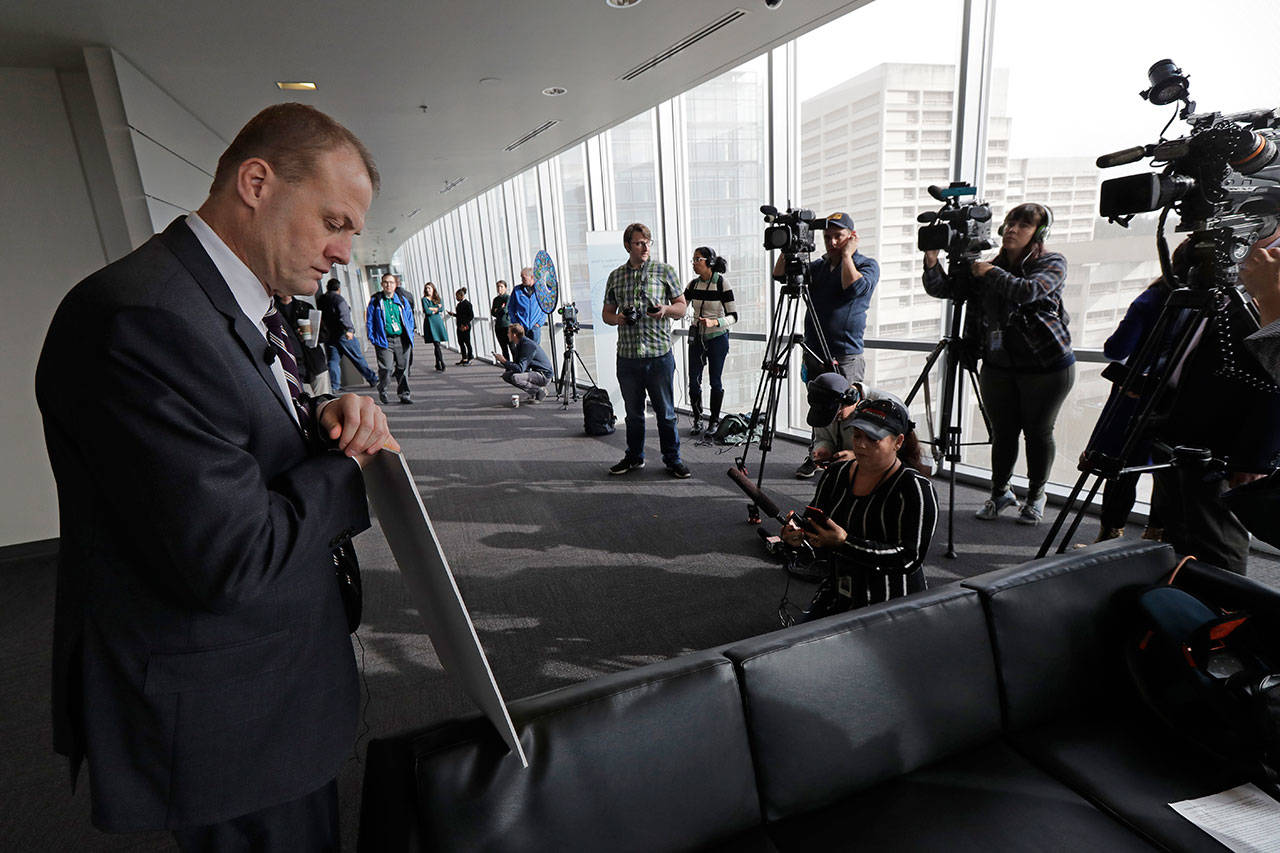By The Herald Editorial Board
Tim Eyman, who for more than 20 years has made a career of championing anti-tax and other voter initiatives, responded quickly Wednesday to news that the City of Seattle, an association of municipal governments, transit agencies and others had filed suit to declare unconstitutional his latest appeal to taxpayers, Initiative 976, which is now certain to pass with about 53 percent support.
“Rather than accept the voters’ clear decision, Seattle government is suing the voters because the voters disobeyed and voted for it anyway,” Eyman said in an email blast. “It’s a slap in the face to the people who clearly oppose these dishonest vehicle taxes,” defending the initiative that promised $30 vehicle license tabs to owners.
Eyman must have known, however, that I-976 was going to face such a challenge in the courts, and not because the measure’s opponents are a cabal of transportation empire builders seeking revenge. Simply, he knew this was coming because he’s been here before. Many times.
Eyman, since he launched his first initiative campaign in 1998, has put 17 measures before the voters; six were rejected in elections, and 11 were approved. But of those 11, eight were overturned fully or partially in court, including his first $30 license tab measure, I-695, approved by the voters in 1999. By 2000, the state Supreme Court ruled the initiative unconstitutional because it violated what’s known as the single-subject rule, holding that ballot measures address no more than one subject, allowing voters to show their clear intent.
The lawsuit filed Wednesday in King County Superior Court challenges I-976 on single-subject grounds and on others, including that its title misled voters on its provisions and impacts; repeals state statutes without disclosing them to voters; that its statewide vote repealed the decisions of local voters; and, specific to Sound Transit, that it would impair contractual bond obligations.
The merits of those issues will be up for courts — and ultimately the state Supreme Court — to determine, but Eyman and his supporters are wrong to claim that this is a case of I-976’s opponents simply not liking the outcome of the election.
Like the automatic replay review of a touchdown in an NFL game, I-695 warrants scrutiny on these constitutional issues because so much is at stake.
That need is expressed in the first sentence of the lawsuit: “Whether passed by the Legislature or by the people, all laws in the State of Washington must comply with our Constitution.”
The outcome of I-976’s adoption or rejection matters more than a touchdown.
Following quickly after the initial returns were announced on Election Day, Gov. Jay Inslee directed the state Department of Transportation to postpone construction and other projects across the state that had not already started, and directed other agencies, such as the State Patrol to defer non-essential transportation program spending.
I-976 would sap about $1.9 billion from state construction and another $2.3 billion for local projects that had already been approved by state lawmakers in the Legislature’s six-year transportation plan. Undoubtedly, this is likely to suspend or delay several projects planned for Snohomish County.
I-976 also has jeopardized funding that local municipalities have counted on for road maintenance and transit programs, $58 million statewide in 2018. Locally, Everett, Edmonds, Lynnwood and Granite Falls use Transportation Benefit District funding to keep roads maintained and support bus routes and paratransit services.
And I-976 would also remove one leg of a three-legged funding package for Sound Transit — whose service district includes the urban areas of Snohomish, King and Pierce counties — and its transit projects. Voters in 2016 approved extension of the Link light-rail service into Everett, Tacoma, West Seattle and Ballard as well as other transit improvements. As it was, Everett would have waited until 2036 to see its first Link train. The Everett line now faces significant delay if not outright cancellation.
Discerning the intent of those who voted for I-976 is not as simple as it might seem. Was it a vote against transportation spending in general? Or just certain projects? A reaction to the sticker shock of Sound Transit’s ST3 package? A rejection of the license tab taxes and fees to fund transportation projects? A referendum on Eyman? A pointed message to the Legislature and state transportation officials?
Currently, revenue from vehicle license fees and taxes provides nearly a quarter of the state’s transportation revenue. If not license tabs, from where should that money come?
Regardless of what the courts find regarding I-976’s constitutionality, we are left with those and other questions. What voters have made clear is that something’s not right with how we fund the state’s transportation system: highways, city streets, county roads, bridges, bus service, ferries and more.
Votes have been cast and counted, but state lawmakers, elected officials and transportation policy makers will need more direction on what those votes meant.
Talk to us
> Give us your news tips.
> Send us a letter to the editor.
> More Herald contact information.

























